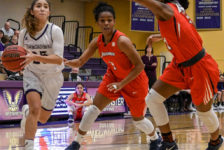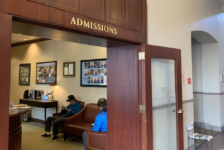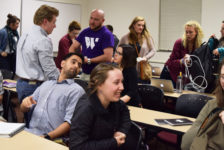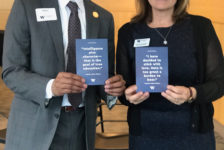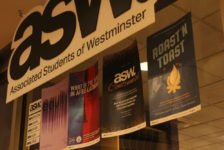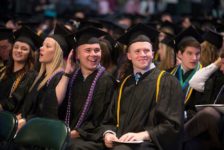
Daniel Cairo logs on to his computer to begin his work day as the new director of the Student Diversity and Inclusion Center. Cairo said that the main focus of the center is to provide resources, advocacy, and safe spaces for people who feel marginalized on campus. Photo by Alisa Scott
The position of director of student diversity and inclusion has been filled after sitting vacant for nearly a year, and its center has moved to a new location on campus.
Daniel Cairo started as the director in early March, leaving the University of Illinois at Chicago to come to Westminster.
Cairo served as assistant director at the Campus Advocacy Network, where he focused on education and outreach. His focus is on providing comprehensive education and training on issues of interpersonal violence, according to an email sent out to Westminster faculty and staff.
The Student Diversity and Inclusion Center moved to room 107 in the Bassis Student Center. Cairo said he has been meeting with students and administrators to gauge where the college is at and how to move forward. The main focus of the center is to provide resources, advocacy and safe spaces for people from a variety of social identities who feel marginalized on campus, Cairo said.
He said another part of the center is to make sure the rest of campus is creating inclusive spaces to serve all students and open conversations about social equity.
Q: What made you want to take the position as director of the Student Diversity and Inclusion Center?
A: To come to a college that was at a time where they were willing to have difficult conversations about diversity and equity and [ask], “What does it mean for a college to start to be reflective about their policies or initiatives in ways that really included marginalized students?” We know that right now in this particular moment, colleges and universities are going through student activism and people feeling alienated. It’s real, and in some places it’s more of a problem than others. The fact that Westminster is willing to, at this moment, listen and be like, “We do have to make some changes” to me, was a sign in the right direction, and I just wanted to be a part of that change and that conversation.
Q: What do you think will be most challenging?
A: Sometimes, when we ask people to reflect on issues of power and privilege, sometimes those are difficult conversations to have… As good people, we have to examine our biases or maybe things we haven’t reflected on so much in order to create more meaningful and positive change. And those things are hard… I’m privileged because, while I may be a person of color, I’m also a male in this society, and as a man, I have to continue to examine the ways in which my male privilege impacts how I have relationships with people. Like any good work, figuring out how we work with others and how we operate in this world is difficult to do, but I think that if we can continue to create a space where we’re encouraging people to have those conversations, it will be encouraging them.
Q: How will your work impact student life?
A: Being able to provide accountable, safe and brave spaces where students of color and queer students can exist or students from other marginalized communities—a place where students can come together and help provide insight or feedback to what we need to do as a university or just to be a support network. If someone has a bad day in class, my door is open. Let’s talk about it, you know, if someone has a success. I want to share those too… Student mentorship and advocacy is such a big component of my philosophy that I get so much from interacting with students on a daily basis, and I just hope that I really work to make it reciprocal… I have a bucket of candy there, so even if it’s like, “I need some chocolate today,” come on over.
Q: What are your goals for the future of the center?
A: I really want the center to be an active and visible student-driven component of the campus…That students want to come here and be a part of the center and interact with the center and be volunteer or service leaders. To really be a hub for conversation, for activism, for solidarity across campus. I think that would be amazing to have at the center… My vision for the center is to be a place where things are happening in positive and meaningful ways for the campus.
Q: Why is it important for Westminster to have this center?
A: The country is changing. Not only is the country changing, but colleges and universities across the states are changing. If you look at Salt Lake City alone, the highest growing demographic are Latinos and Latinas. That impacts how we operate in this community. But aside from the fact that demographics are changing, to me it’s our mission to engage critical scholarship and have difficult conversations about [how] to be better, more informed global citizens, members of a community. We have to also be able to have conversations about power, privilege and oppression. So, a center like this really hopes to be that bridge or to provide a space where people are doing that.

